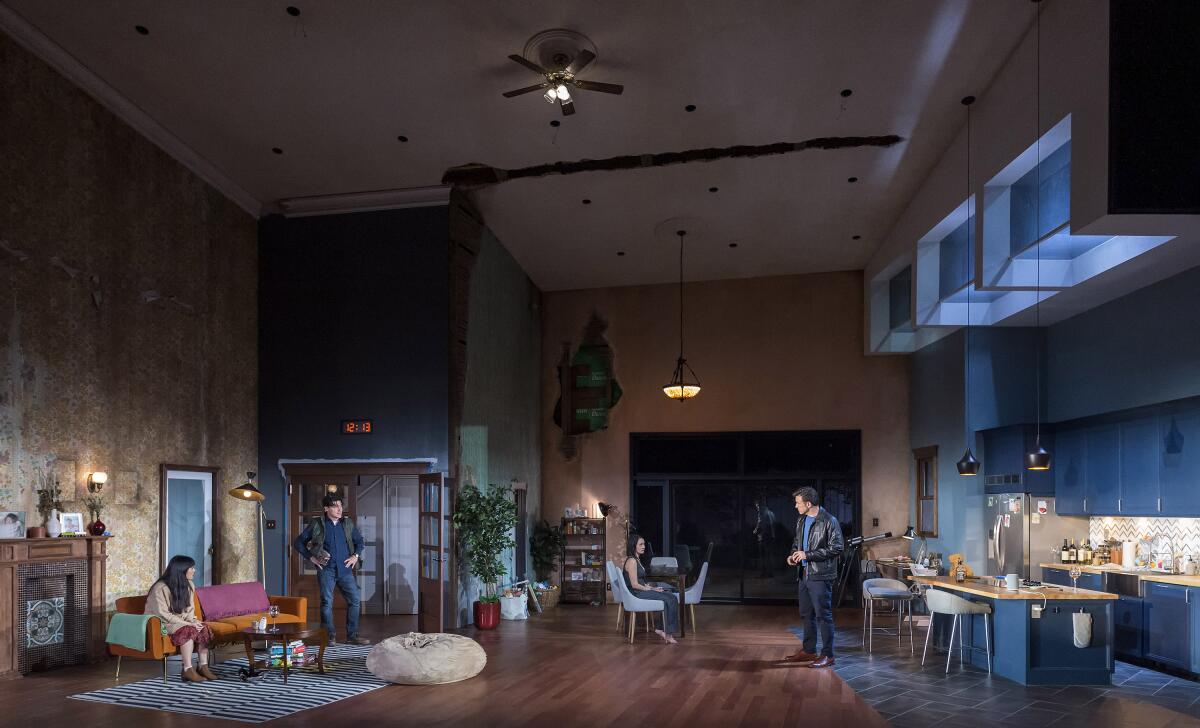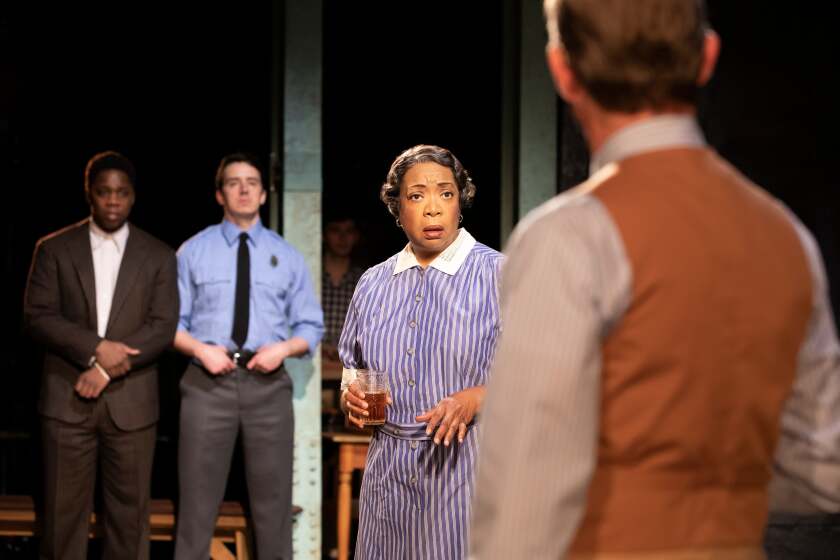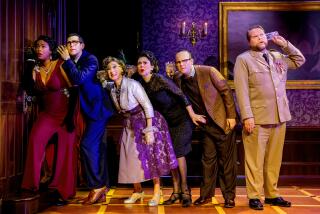Review: In the Ahmanson’s ‘2:22 - A Ghost Story,’ poltergeists are more believable than people

Horror seldom rears its ugly head at the better theaters. The genre is much more at home in the pitch dark of movie houses, where viewers can scream anonymously while comforting themselves with fistfuls of buttered popcorn.
But the stage is fully capable of terrifying an audience. (And no, I’m not talking about the recent deconstruction of “Oklahoma!” that upset so many Ahmanson subscribers.)
Centuries before “The Exorcist,” Shakespeare was conjuring evil spirits in “Macbeth.” Before “Night Must Fall” and “Wait Until Dark” had moviegoers on the edge of their seats, they were hit plays.
And the story is hardly dead and buried: Conor McPherson, a modern master of ghost dramas, has found poetic truth in inexplicable phenomena in plays such as “The Weir,” “Shining City” and “The Seafarer.”
“2:22 – A Ghost Story,” which opened Friday at the Ahmanson Theatre, isn’t just following in this tradition. The production, directed by Matthew Dunster, is trying to give sophisticated modern horror a run for its cinematic money.
Sound and lighting effects are engineered to fray nerves. The all-important dream home that becomes a living nightmare sprawls stylishly across the stage. A digital clock with devilish illumination counts down the minutes to the inevitable confrontation with the menacing unknown.
The U.S. premiere of “2:22 – A Ghost Story,” which debuted in London’s West End last year, seems determined to make theatrical fright nights fashionable again. The staging, as slickly modern as it is unapologetically sensationalistic, makes an appeal to a new and perhaps younger demographic — the kind of folks who might not think an Ahmanson outing is for them.
The show’s obvious scare tactics can get a little campy, but laughter isn’t incompatible with fear. Indeed, it may be a necessary safety valve.
The occasionally over-the-top staging isn’t what ultimately holds the production back, though. The problem is the writing. The occult world is made to seem perfectly natural, but everyday reality sorely lacks credibility.
The script by Danny Robins, who created the popular podcast drama “The Battersea Poltergeist,” strains the considerable talents of the American cast that has been assembled. It’s a waste of acting resources to gather Constance Wu (“Crazy Rich Asians,” “Fresh Off the Boat”), Finn Wittrock (Mike Nichols’ Broadway revival of “Death of a Salesman,” many Ryan Murphy endeavors) , Anna Camp (“True Blood” and the “Pitch Perfect” trilogy) and Adam Rothenberg (Mel Sattem on the final two seasons of Neflix’s “Ozark”) for a Center Theatre Group offering that is more surface than substance.
Aaron Sorkin’s hit Broadway stage adaptation of Harper Lee’s ‘To Kill a Mockingbird’ shapes the classic 1960 novel for a new era.
The figures in the play — modern types whose identities are hastily compiled like errant Wikipedia entries — are portrayed with high television sheen. But they speak and act in ways that often don’t compute. Psychological coherence takes a back seat to tricksy plotting.
The setting is a house undergoing renovation in a newly gentrified neighborhood in Boston. Jenny (Wu) is doing some last-minute paint touch-ups when we first encounter her. She has one ear cocked toward the baby monitor as the gurgling of a sleeping infant pipes through.
Time scrambles, and Jenny and Sam (Wittrock), her physics professor husband, are entertaining another couple. Lauren (Camp), who went to college with Sam, and her romantic partner Ben (Rothenberg), who grew up in the neighborhood before it became chic and has the thick Boston accent to prove it, have come to check out Jenny and Sam’s new life and drink as much booze as characters in an Edward Albee play.
Jenny is noticeably short-tempered with Sam. She’s angry that he didn’t call to explain why he would be so late, but she’s more upset that he left her alone in the house. Something happened the other night in the baby’s room, at 2:22 a.m., that has convinced her that the house is haunted.
Sam gives no credence to the idea of ghosts. But his arrogant rationalism feels like a betrayal to Jenny, who resents living in a scary house she had reservations about from the start.
As glass after glass of wine is downed, supernatural tales are exchanged. Opinions on the subject are divided, but conflicts are inflamed by male egos, class resentments and simmering jealousies.
There’s an obvious romantic backstory between Sam and Lauren, but neither character is convincingly drawn. Sam is writing “Astronomy for Idiots,” but the science he trots out sounds like something from a prospective reader of the book. Lauren is ostensibly a mental health care professional, but her “professional psychiatric evaluation” of her friends calls for everyone to get hammered — a suitable laugh line for a character who acts more like an unstrung patient than a clinician.
Jenny and Sam share all the intimacy of tired commuters on a rush-hour train. Lauren and Ben have a spat that escalates so clumsily it’s lucky that theatergoers don’t have access to remote controls.
Human interaction shouldn’t be the hardest thing to credit in a drama that has furniture moving on its own accord.
I’m working assiduously not to spoil any surprises, of which there are quite a few. Was I scared? Not particularly, but I was made jumpy by Ian Dickinson’s tense soundscape (the baby monitor alone!) and Lucy Carter’s unpredictable lighting, recreated here by Sean Gleason.
Anna Fleischle’s scenic design succeeds in turning the house into one of the production’s main characters. But the dimensions of the Ahmanson stage are so vast that it’s as if cocktail banter were being traded across a canyon.
The ending is clever, but I rolled my eyes — partly in disbelief, partly in chronological confusion. The moments leading up to the final twist struck me as more persuasively original. But if I say another word I’ll be haunted by scores of readers complaining that I spoiled the fun.
Where: Ahmanson Theatre, 135 N. Grand Ave., L.A.
When: 8 p.m. Tuesdays through Fridays, 2 and 8 p.m. Saturdays, 1 and 6:30 p.m. Sundays. Ends Dec. 4. (Call for exceptions)
Tickets: $40-$175 (subject to change)
Information: (213) 972-4400 or centertheatregroup.org
Running time: 2 hours, including one intermission
COVID protocol: Masks are strongly recommended.
More to Read
The biggest entertainment stories
Get our big stories about Hollywood, film, television, music, arts, culture and more right in your inbox as soon as they publish.
You may occasionally receive promotional content from the Los Angeles Times.












